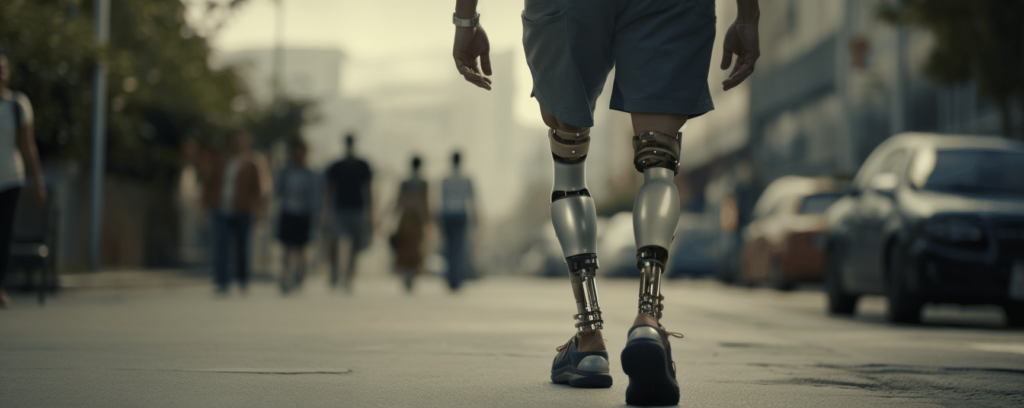The Right Amputation Lawyer: Expert Guidance for Limb Loss Claims
Last updated Thursday, October 31st, 2024

Navigating a legal case after an amputation can be overwhelming. An amputation lawyer offers specialized support, helping you to claim the compensation you need and deserve. This article breaks down how an amputation lawyer advocates for your rights, handles complex legal procedures, and lifts the burden from your shoulders, allowing your focus to remain on recovery.
Key Takeaways
- Isaacs & Isaacs specialize in guiding victims through the complexities of claiming compensation for limb loss, ensuring they can focus on their recovery while the legal aspects are being handled professionally.
- Identifying the responsible parties and establishing liability is a critical step in amputation injury cases, whether it stems from an accident, workplace incident, or medical malpractice, necessitating deep legal expertise in evidence gathering and legal strategy.
- Amputation injury claims encompass economic damages for tangible losses like medical expenses, lost income, and future financial implications, as well as non-economic damages for intangible losses like pain and suffering, requiring meticulous calculations and expert legal assistance.
Understanding Your Need for an Amputation Injury Lawyer
The grief of traumatic amputation injuries and their aftermath can be magnified by the legal complexities involved in such cases. A seasoned amputation injury lawyer can alleviate this stress, guiding you through the intricate legal proceedings and advocating for your right to just compensation. With the help of amputation injury lawyers, you can focus on your recovery from traumatic amputation injuries while Isaacs & Isaacs handle the legal aspects of your case.
The Role of an Amputation Injury Attorney

Isaacs & Isaacs’ responsibilities extend beyond the courtroom, involving:
- Assistance in navigating the legal process
- Documenting damages
- Organizing medical records
- Creating treatment plans
They also provide support at each stage of the lawsuit and play an invaluable role in helping victims cope with the physical and emotional challenges of limb loss.
How Amputation Lawyers Advocate for Victims
Dedicated amputation lawyers employ various legal strategies to fight tirelessly for their clients and ensure they receive just compensation. One of their main tasks is to conduct in-depth investigations and gather evidence, which can include obtaining witness statements and enlisting experts to analyze injury-related factors.
But their role doesn’t end with gathering evidence. They also assist their clients in negotiating a fair settlement with the insurance company or pursue damages in court. They are instrumental in securing compensation for individuals who have undergone amputation, helping streamline the compensation-seeking process and ensuring victims can focus on their recovery.
Assessing Liability in Amputation Injury Cases
In amputation injury cases, establishing liability is vital. Understanding who is responsible for the accident and how it happened can significantly impact the legal approach and potential compensation. This is where the expertise of an amputation injury lawyer can prove invaluable.
Identifying Responsible Parties
Identifying the responsible parties in an amputation injury case can be a complex process. It involves:
- Carefully examining the circumstances of the injury
- Gathering and preserving evidence
- Obtaining witness statements
- Potentially enlisting experts to analyze all the factors involved
The responsible party could be an individual, an employer, or a medical professional. For instance, in cases of workplace amputation injuries, the employer or a third party could be held accountable. Similarly, in cases of medical malpractice, physicians, surgeons, or other medical professionals could be deemed accountable.
In some cases, product liability may also come into play, particularly when a serious injury results from defective or malfunctioning machinery.
Accident or Medical Malpractice?
Ascertaining whether an amputation injury is due to an accident or medical malpractice is another key aspect of determining liability. Accidents typically result from non-medical negligence, such as a car accident or workplace incident, whereas medical malpractice refers to errors or negligence in medical care.
In case of medical malpractice, an amputation could occur due to negligence or errors made by a medical professional during a treatment or surgical procedure, leading to the necessity of amputation or directly causing limb loss. Establishing fault in such cases can be challenging and requires a meticulous analysis of the accident’s circumstances, collection of evidence to determine liability, and the presentation of witness testimony.
Financial Implications of Losing a Limb
Limb loss, often resulting from a severe limb injury, impacts not only an individual’s physical and emotional well-being, but it also carries substantial financial implications. The cost of medical expenses, prosthetics, and rehabilitation, coupled with the loss of income, can be overwhelming. A seasoned amputation injury lawyer can guide you through these financial challenges, ensuring you receive the deserved compensation.
Medical Expenses and Prosthetic Devices
The cost of medical care following an amputation can be staggering. The initial hospitalization, surgeries, and rehabilitation costs are just the tip of the iceberg. The estimated average cost of medical expenses related to amputation surgery is $509,272. These expenses do not include the cost of prosthetic devices, which can range from under $10,000 for a basic leg to as much as $70,000 for a computerized leg.
Moreover, prosthetic devices require regular maintenance and replacements, typically every two to four years. These costs can quickly add up over the course of a lifetime. In addition to these direct costs, there may be indirect expenses such as home modifications, assistive technologies, and ongoing physical therapy.
An experienced amputation injury lawyer can help you calculate these costs and seek fair compensation.
Loss of Income and Employment Challenges
In addition to the medical costs, loss of limb can significantly impact an individual’s ability to work. Depending on the nature of their job, individuals who have undergone an amputation may face a loss of income due to the inability to perform certain tasks or job requirements. This can lead to a substantial decrease in their earning capacity, adding to the financial burden.
Moreover, amputation victims often encounter employment obstacles. They may face difficulties reentering the workforce, especially as they age, and may need to transition to less physically demanding roles that demand higher cognitive abilities. These challenges, coupled with the psychological effects of job loss, can further add to the financial strain. An experienced amputation injury lawyer can guide you through this complex process and help you claim compensation for lost wages and reduced earning capacity.
Legal Strategies for Amputation Claims
A solid legal strategy is vital to successfully navigate an amputation injury claim and secure just compensation. An experienced amputation injury lawyer will employ a range of strategies tailored to your specific case.
Gathering Evidence and Building a Case
Building a strong case for an amputation injury claim begins with:
- Gathering robust evidence
- Collecting medical records
- Obtaining witness statements
- Preserving all evidence related to the accident
This evidence is then used to establish liability, document damages, and build a compelling case against the responsible parties. The lawyer may also call upon expert witnesses to validate the plaintiff’s requests for compensation and help quantify the damages. A comprehensive and well-constructed case can significantly increase the chances of securing a favorable settlement or court ruling.
Negotiating with Insurance Companies
Negotiating with insurance companies can be an intimidating process. Insurance companies often attempt to minimize payouts, and navigating such negotiations can be challenging for individuals without legal expertise.
An experienced amputation injury lawyer, who is also a skilled personal injury lawyer, can:
- Level the playing field
- Prepare a compelling case to showcase the severity of the injury
- Engage in assertive private negotiations to secure the highest possible settlement for their clients
- Represent the client’s interests and leverage their knowledge to navigate intricate insurance policies
- Ensure that you receive full and fair compensation for your injuries
Compensation Types in Amputation Injury Lawsuits
In amputation injury lawsuits, compensation typically falls into two broad categories: economic and non-economic damages. Both these types of compensation aim to make the victim ‘whole’ by providing financial restitution for the losses incurred due to the injury.
Economic Damages: Calculating the Tangible Costs

- Medical expenses
- Lost income
- Reduced future earning capacity
- Expenses related to assistive devices or medication
These damages are determined by assessing the long-term financial implications of the amputation, taking into account both present and future financial losses.
For instance, the cost of medical expenses and the loss of income due to the inability to work can be relatively straightforward to calculate. However, projecting future medical expenses and the loss of future income can be more complex and often requires the expertise of an experienced amputation injury lawyer.
Non-Economic Damages: Valuing the Intangible Losses
Non-economic damages, on the other hand, refer to the intangible losses suffered by amputation victims. This includes pain and suffering, disability, and loss of enjoyment of life. While these losses may not have a direct financial cost, they can significantly impact the victim’s quality of life.
Calculating non-economic damages can be challenging due to their subjective nature. One common approach is the Multiplier Method, which involves adding economic damages and then multiplying the total by a factor ranging from 1.5 to 5x. However, the severity and impact of the injury, the impact on the victim’s daily life, and the emotional distress caused by the injury are also considered.
Selecting an Experienced Amputation Injury Lawyer
Selecting Isaacs & Isaacs can greatly impact the outcome of your case. We bring specialized expertise and experience to the table, which can be crucial in navigating the complexities of an amputation injury case.
Criteria for Choosing the Right Law Firm
When selecting an attorney for your amputation injury case, consider the following:
- Their expertise in handling similar cases
- Their success rate in securing suitable compensation for amputation injuries
- Their understanding of the legal fees and costs related to their services
You’ll want someone with a proven track record in these areas.
Recovery Journey for Amputation Injury Victims
Beyond legal proceedings, the path to recovery for those who suffered amputation injuries can be lengthy and fraught with challenges. It involves physical rehabilitation, emotional healing, and the need to adapt to a new way of life for amputation injury victims.
Rehabilitation and Adaptation
Rehabilitation following an amputation involves a comprehensive program that includes:
- Wound healing
- Pain management
- Mobility training
- Prosthetic fitting and training
- Various physical therapy techniques to facilitate recovery and help the victim regain strength and mobility.
However, physical recovery is just one aspect of rehabilitation. Amputation can also have profound psychological effects, including feelings of loss, changes in body image, and a significant shift in one’s sense of self-identity. Emotional and psychological rehabilitation, including cognitive behavioral therapy, can be crucial in helping individuals manage these challenges and adapt to their new reality.
Support Systems and Resources
Support systems play a crucial role in the recovery journey for amputation victims. These can include peer support groups, mentorship programs, and various organizations that provide resources and support for individuals with limb loss.
Medical professionals and therapists can also be invaluable sources of support. They can assist patients in setting realistic goals, adopting adaptive coping styles, and engaging in exercises that gradually strengthen the stump and remaining limbs. By leveraging these support systems and resources, amputation victims can navigate their recovery journey more effectively.
Frequently Asked Questions
How much compensation for losing a leg?
The compensation for losing a leg due to an accident is typically between $220,890 and $313,683, based on case law and adjusted for inflation rates.
How many hours does it take to amputate a leg?
Amputating a leg can take between one to three hours, depending on various factors, but your surgeon can provide a specific estimate based on your situation.
How much does losing a limb hurt?
Losing a limb can be extremely painful, leading to both physical and mental trauma, and for over 80% of amputees, chronic pain can be almost as debilitating as the original injury.











